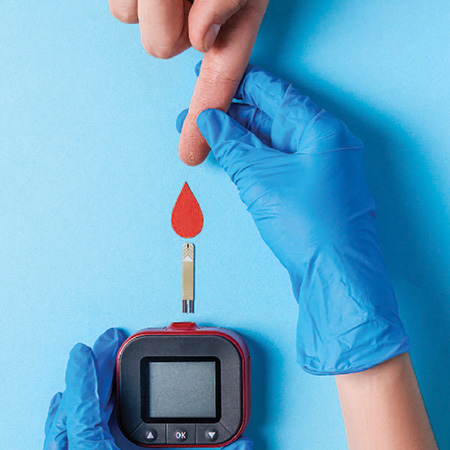
Fasting and Diabetes
It is important that individuals with diabetes consult their doctor before they begin to fast during the Holy Month of Ramadan in order to help them control their blood sugar, avoid complications from fasting and achieve their planned health objectives.
General Guidelines for Diabetic People during Ramadan
There are multiple types of diabetes. Some diabetics only need to diet to control their blood sugar, while others need to take pills or insulin in addition to their special diets. Children and young patients with diabetes depend on daily insulin injections to control their blood sugar, where insulin doses and timings are scheduled to match their meals. Generally, those patients are not advised to fast to avoid high or low blood sugar levels, which can result in coma and other serious health concerns.
Patients who are on controlled diets need to speak to their doctors before fasting. If they are allowed to fast, they have to follow the same meal plan, which includes three meals: (evening) Iftar, (Suhoor) Fajr, and midnight. The Iftar meal should be taken right after sunset (not to be delayed) to avoid low blood sugar levels, while the Suhoor meal should be eaten as close to Fajr (predawn) as can be permitted.
Diabetics who are fasting and are on oral pills or insulin are advised to avoid exercise during the daytime, especially in the afternoon, to avoid low blood sugar levels. Patients can exercise (walking) 1 to 2 hours after the Iftar meal for 30 to 45 minutes with a doctor’s approval. Patients should always carry their Diabetic ID cards, along with a source of fast-acting carbohydrates, such as three dates, to quickly consume in the event of a low blood sugar event (hypoglycemia).
Diabetics on oral pills who take them once a day (extended acting) are advised to consult with their doctor to determine if they have to change the dosage timing. Generally, patients are advised to have one tablet at Iftar (evening) time and just half a tablet during Suhoor, to avoid low blood sugar levels during the day.
Pregnant diabetics are advised not to fast to avoid low blood sugar levels, ketosis and other health concerns. This might put them and their unborn babies at risk.
It is very important to monitor your blood sugar levels before meals and before taking oral medications or insulin, recording the results and discussing them with the assigned medical experts.
With the doctor’s approval patients, who are on diuretics, are advised to take them after the Iftar meal rather than after Suhoor, to avoid dehydration and thirst during the daytime, as well as other health concerns.
Fasting and other health issues
Fasting and Gaining Weight
As a result of cultural influences, the Holy Month of Ramadan can significantly contribute to weight gain because fasting Muslims tend to prepare too much oily food and break their fast with a feast. Iftar is not Iftar without LoQaimat and deep-fried Samboosas. In addition, the Vimto drink has practically become a standard during Ramadan. Unfortunately, all of these give you too many calories. The solution is to eat moderately, grill rather than fry, avoid artificially sweetened drinks, and ensure that you do not miss the Suhoor meal.
Fasting and Constipation
Many people may experience constipation, which is the most common gastrointestinal problem during Ramadan. The movement of food through the digestive system takes longer than normal. This can result in the waste becoming hard and defecation being irregular and painful.
To prevent constipation during Ramadan, here are some helpful suggestions:
- Consume at least five servings of fruits and vegetables daily. These will provide your body with substantial amounts of fiber.
- Choose whole-wheat bread (rather than white) and fiber-containing cereals (rather than refined).
- Add vegetables, legumes, or corn to rice and pasta dishes and soups, such as Mojadarah (lentil rice). • Include salads such as Tabbouli, Fatoush, Hummus, Moutable, Baba Ganouch, beans, etc., at your Iftar and Suhoor meals and for snacks as well.
- Include fiber-rich soups, such as grains, vegetables, or lentils at your Iftar and Suhoor meals and snacks to provide your body with both fluids and fiber.
- Consume sufficient fluids, such as water, vegetable juice, unsweetened fruit juice, low fat or nonfat milk, and fat-free soups with your meals and snacks.
Fasting and Heartburn
Stomach acid, which digests food, is usually reduced during fasting. However, the smell of food can incite the brain to signal the stomach to produce more acid which in turn can lead to heartburn.
How should you deal with heartburn during Ramadan?
- If you are on antacids, continue taking them, preferably with the Suhoor meal.
- After fasting, eat in moderation.
- Avoid oily, deep-fried, and very spicy foods.
- Reduce your caffeine intake.
Fasting and Headaches
Headaches while fasting can be triggered by hunger, dehydration, poor sleep, or withdrawal symptoms caused by not smoking or an absence of caffeine in your system. Do not miss the Suhoor meal, make sure that you drink enough water, gradually and consistently. Ensure that you get enough rest and finally, take the opportunity given to you during the Holy Month of Ramadan to quit smoking.
